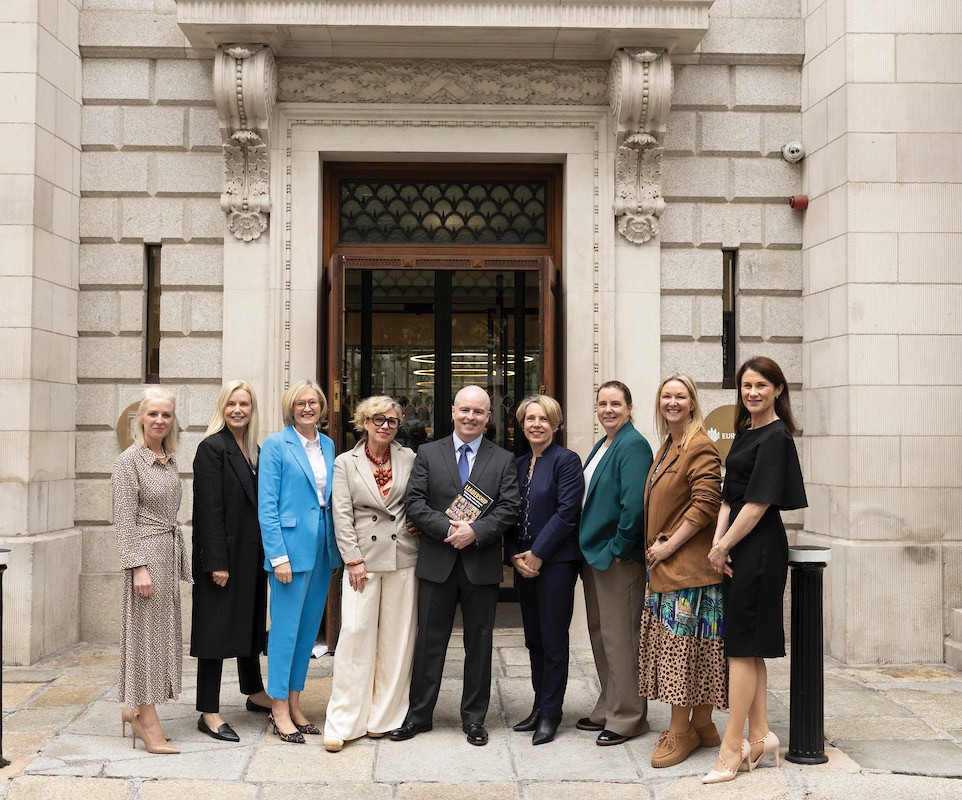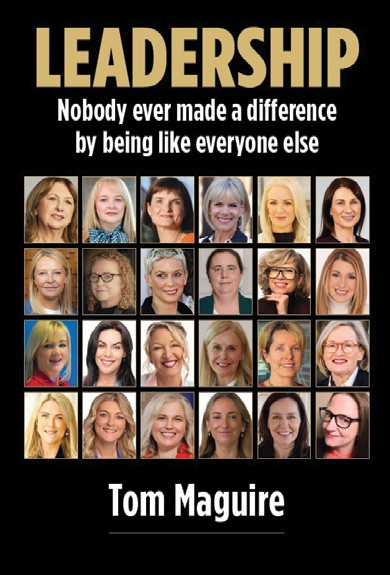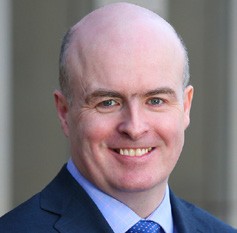“Good leaders create a trusting environment where participation is encouraged”
In his new book, Leadership: Nobody Ever Made a Difference by Being Like Everyone Else, Tom Maguire brings together the voices of 24 trailblazers redefining leadership today
When I speak at career events at universities around Ireland, I always use the line, “Nobody ever made a difference by being like everyone else” from the 2017 movie “The Greatest Showman”. It is such a powerful statement because success comes from doing things that haven’t been done before.
All 24 leaders featured in my new book come from different environments, educational backgrounds and experiences, but they are all leaders in their field. Several asked me the same question when I approached them to contribute: “Why are you only speaking to women leaders?”
This is a simple question, but a difficult one to answer because it wasn’t a deliberate decision at the outset.
When I sat down to write a list of leaders I wanted to talk to—leaders I admire for what they have achieved and, much more importantly, how they have achieved it—I’d written down about 10 names before I realised all were women.
That struck me. I sat back, thought about it, and realised I was brought up by three very strong, courageous and empathetic women: my mom, her sister and their mother.
My mom taught me that, ‘If you have no word, you have nothing,’ and she—and they—made me into the man who sat down to write that list of leaders. I hope that, although, sadly, they are no longer with us, their legacy continues.
Our Lady’s Hospice in Dublin looked after my mom and her brother Thomas in their final days. I have often described its staff as Earth’s angels, because of it, all royalties from Leadership: Nobody Ever Made a Difference by Being Like Everyone Else will go to Our Lady’s Hospice.
Who should be a leader?
Straight off the bat, let’s get one thing clear: There are those who should be leaders and those who should not. Some people look after themselves more than, or instead of, those who are in their charge. Some look to short-term gain to the detriment of the future.
There are those who see a team member’s success as something that should belong to the leader rather than celebrating that team member.

We all know them, we’ve all seen them and there are many words used to describe such individuals: narcissists, bullies, harassers, those who suck the life out of any room or, as someone described them to me, people who “make the molecules in the air change when they walk in”.
My book is not about them. It is about inspiring others to see what a leader should be. It is about those leaders who will ask, “What role have I played in this result?” when the ‘number two’ hits the fan, as Sonya Lennon, founder of Lennon Courtney, Work Equal and LIFT, put it when we spoke.
They take personal accountability for their actions and look to rectify what has happened, with the help of those around them.

Are you a leader?
Of all the words used in this book to describe a good leader, time and time again, the contributors bring up the concept of integrity.
Louise Phelan, former Vice-President of PayPal, describes integrity as “paramount”. She explained that integrity is more important than anything else because it is her brand, and she “won’t let anybody impact my brand”.
If someone does something she doesn’t agree with, Louise will step away from the situation:
“I’m not engaging in that because my brand is too important for me and I have no interest in anything contrary to that”, she says.
Integrity and trust in leadership
Former Irish President Mary McAleese noted that if a leader is “caught out in favouritism, in cronyism and/or in just plain lying” then trust in that leadership is lost.
She succinctly said, “Truly, you can’t be regarded as a leader”. She went on to say that integrity is a “huge” part of the trust a team should have in their leaders and vice versa.
Mairead McGuinness, former European Commissioner and Vice-President of the European Parliament, sums up the qualities of good leaders as those who make leadership look easy by their calm demeanour and clarity of thought and expression.
Good leaders listen carefully and read body language as much as the spoken word, and they see when someone on the team is not in a good place and needs support.
As McGuinness sees it, good leaders must be able to build resilience in their teams and get the best from those around them. They must set objectives, act with humility and learn every day.
Martina Fitzgerald, Chief Executive of Scale Ireland, says that a good leader sees problems and challenges as opportunities, develops a strategic plan to address them and puts that plan into action.
The plan must be evidence-based, with high standards, consistency, clear communication, targets and regular reviews. In Martina’s view, a good leader has to be open to constructive feedback and change and motivate a team and stakeholders. Ultimately, leaders must make the decisions.
Emotional intelligence: the leadership trait
June Butler, Chief Executive of the Strategic Banking Corporation of Ireland, notes that the concept of leadership has changed fairly significantly from the time she started her first job.
She explained that back then, leadership seemed to be about “tell, then do”.
For Butler, the characteristics of good leadership centre more on emotional intelligence—kindness, caring and self-awareness are the key traits of a strong leader. This means being aware and conscious of the impact you have on others as a leader.
She notes that leaders are responsible for the people they lead, “who do the job, who make the organisation tick, and who achieve what we want collectively”.
“We’re responsible for the people who deliver, and so we, as leaders, need to be able to provide support and encouragement, particularly when the going gets tough.”
Ultimately, there is no one definition of a good leader. Different situations may require different types of leadership at any one time, but to my mind, the throughline in my conversations with the leaders in this book is the critical need for a solid foundation of decency, integrity and empathy.
Above all, good leaders create a trusting environment where participation is encouraged.
This sums up what leadership should be, and I hope, through this book, to help future leaders lay the groundwork for positive impact in a fast-moving world.
I am grateful to the 24 female trailblazers across business, politics, technology, finance and public life featured in my book, each of whom offered an honest look at what it really means to lead in today’s world. While their paths vary widely, one value connects all: integrity. From the boardroom to the cabinet table, these leaders agree that integrity is the cornerstone of effective leadership.
“GOOD LEADERS LISTEN CAREFULLY AND READ BODY LANGUAGE AS MUCH AS THE SPOKEN WORD, AND THEY SEE WHEN SOMEONE ON THE TEAM IS NOT IN A GOOD PLACE AND NEEDS SUPPORT”
Whether making tough decisions, navigating challenges, or managing change, these leaders speak to the need for courage and a willingness to take responsibility.
They hold themselves to account. They ask, ‘What role did I play in this result?’ This mindset is the difference between management and true leadership.

Leadership: Nobody ever made a difference by being like everyone else by Tom Maguire is published by Orpen Press and available to pre-order now at orpenpress. com/books/leadership, priced at €18 (excluding shipping). All royalties from the sale of the book will go to Our Lady’s Hospice in Dublin
About the author
Tom Maguire is a Tax Partner with Deloitte and leads the firm’s Tax Policy and Technical Services team. He is also adjunct full professor at University College Dublin’s Michael
Smurfit School of Business.
He is a Fellow of the Irish Tax Institute, a Fellow of the Association of Chartered Certified Accountants and holds an MBA from Trinity College Dublin.
Maguire is the current author of Ireland’s leading texts, Irish Income Tax (formerly known as Judge), The Taxation of Companies (formerly known as Feeney) and his own Irish capital Gains Tax. All of the above contain forewords by Ministers for Finance Donohoe and McGrath. He also wrote Crisis, 25 Business Leaders on Surviving in Troubled Times which contained a foreword by then Tanaiste Leo Varadkar.
He is a steering group member with Scale Ireland, a not-for-profit promoting Irish tech start-ups and scaling companies.
